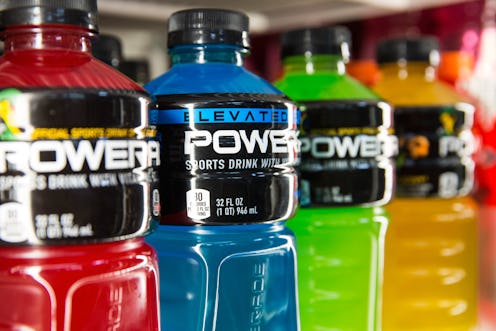News
The Additive Coca-Cola Had To Remove From Powerade
Brominated Vegetable Oil, or BVO, has been subject to a modern day witch-hunt since Mississippi teen Sarah Kavanagh started a petition in 2012 on Change.org with the intent of convincing Pepsi’s Gatorade to replace BVO with another, less harmful chemical. The company eventually agreed to the switch, and now Coca-Cola has removed BVO from Powerade, announcing on Sunday that the drinks are now “BVO-free.”
According to the AP, there were no details regarding how the company had reformulated the drinks, or when the change would be completed. As of Monday morning, BVO is still listed as an ingredient in two of its Powerade flavors.
BVO is listed by the Food and Drug Administration as a "food additive permitted in food or in contact with food on an interim basis pending additional study," and the FDA limits its usage to 15 parts per million. That certainly is not a classification that inspires confidence. The chemical is used to keep flavor stabilized, or mixed, in fruity drinks, and is found in 10 percent of sodas in the United States, including Mountain Dew, Fresca, and other citrus-flavored beverages.
Excessive BVO consumption has been demonstrated to cause adverse effects including bromoderma, a rare reaction to bromine, which can cause plaques and ulcers, and bromism, which has led to fatigue and memory loss. Still, in these cases, the subject consumed often over 100 times the recommended amount. One man had drunk eight liters of a soda containing BVO called Ruby Red Squirt every day for several months.
Still, according to a federal study, soda, energy, and sports drinks are the fourth largest source of calories in adults.
"Any normal level of consumption of BVO would not cause any health problems -- except the risk of diabetes and obesity from drinking that much sugar water," said Zane Horowitz, medical director of the Oregon Poison Center in an interview with Scientific American.
The Change.org petition cited that since Powerade and Gatorade were supposed to be health foods, they should not include BVO, which is questionably safe. Did you see that? Health food? I'm afraid those clever guerrilla protesters were more duped by clever marketing than they were by their ability to look up BVOs on Wikipedia.
One bottle of Fruit Punch Powerade (the serving recommendation says that each bottle has 2.5 servings in it, but if we're being serious, no one in the history of man has ever measured a precise 12 oz of Powerade before glugging) contains 200 calories and 52.5 grams of sugar. What's that? All that sugar is naturally occurring from the fruits in the fruit punch? Not so. The first ingredient listed (and thus, the most plentiful) is water; the second, high fructose corn syrup. Every other ingredient comprises less than 5% of the drink.
The moral of the story is, yes, BVO is questionably healthy, but Powerade is unquestionably unhealthy. Complaining about BVO in sugar water is akin to complaining about the presence of cheese in Cheetos.
